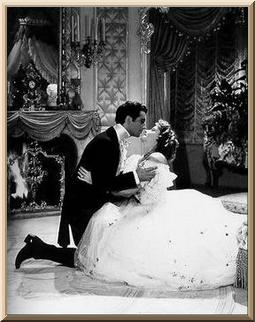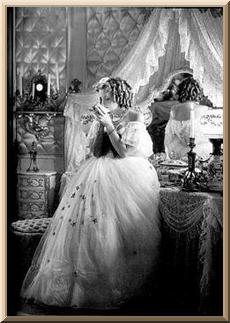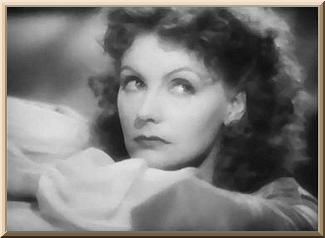

Camille (1936) is one of the most romantically-atmospheric films ever made and a classic, well-known melodramatic love/tragedy of Hollywood's golden age. MGM's lavish, luxuriously-mounted production of director George Cukor's film was the first talking version of the 1852 Alexandre Dumas Fils' (the Younger) novel/play (La Dame aux Camelias) of the doomed romance of a tubercular courtesan. Verdi wrote the opera La Traviata based upon this play. Her final scene is among the finest ever committed to film, as she signals death with her eyes in a lingering close-up. Robert Taylor is so beautiful, you can forgive his lack of skill. His earnestness seems consistent with the rash actions of young love, and his ardent awe of Garbo imparts a worshipful aura that is touching. The fact that he looks younger makes the whore component of Garbo's character more believable; it justifies Armand's not immediately grasping his love's circumstances. This is Daniell's most interesting performance, subtle in his control and villainy. Laura Hope Crews finally is able to utilize her vocal vulgarity; she is by far a better old strumpet than she was an old maid busybody in so many films. Tempestuous Lenore Ulric is a curiousity that works. This former Belasco stage star embodies a disappointed envy of Garbo that Cukor uses to great advantage. Lionel Barrymore, all growling propriety, is the jarring note in the ensemble. The screenplay was adapted from the Dumas play by Frances Marion, James Hilton, and Zoe Akins. And Adrian's costumes, usually white, for Miss Garbo, contribute to her divination of literature's most beloved dying swan. This was Irving Thalberg's last production; he died while it was being made and it was completed by Bernard Hyman. The title role character was immortalized and based upon one of Dumas' acquaintances in Paris, a real youthful courtesan named Marie Alphonsine du Plessis who died at the age of twenty-four. Throughout many years of stage and screen performances, the heroine has been played by various leading ladies on the screen. These include Oda Alstrup (1907), Gertrude Shipman (1912), Sarah Bernhardt (1912), Clara Kimball Young (1915), Theda Bara (1917), Alla Nazimova (in a 1921 film with Rudolph Valentino), Norma Talmadge (1927), Yvonne Printemps (1934 in a French production), and others on the stage including Eleanora Duse (a debut performance in 1893),Tallulah Bankhead, Ethel Barrymore, and Eva Le Gallienne. Most recently, Nicole Kidman tackled the role in Baz Luhrmann's riotous film musical interpretation of the story, Moulin Rouge. Kidman, like Garbo 75 years before her, was nominated by the Motion Picture Academy for her performance, but was denied the Oscar for best actress.






In his first film directing Garbo, Cukor captured the most exquisite, poetic, restrained performance of the great screen actress. In her most popular, the great Garbo was at her radiant peak, and certainly among the top five most romantic movies ever made. Cukor's renowned "rapport" with actresses is unfailing here. MGM's glamour shows unmistakable care.
If it's not the same as style, the luxuriance befits the story of a courtesan. It's a puzzle why Garbo's Marguerite is a whore. She seems too intelligent, too yearning, too serious to have ever considered the demimonde life, yet her acting is so generous, so overcome with the warmth of true love, so tinged with the irony of the character's circumstances, that she sweeps you away.








- Greta Garbo - Marguerite Gauthier
- Robert Taylor - Armand Duval
- Jessie Ralph - Nanine
- Henry Daniell - Baron de Varville



- George Cukor - Director
- Bernard Hyman - Producer
- Irving G. Thalberg - Producer
- Zoë Akins - Screenwriter
- James Hilton - Screenwriter
- Frances Marion - Screenwriter
- William H. Daniels - Cinematographer
- Karl W. Freund - Cinematographer
- Herbert Stothart - Composer (Music Score)
- Margaret Booth - Editor
- Cedric Gibbons - Art Director
- Edwin B. Willis - Art Director
- David Lewis - Associate Producer
- Adrian - Costumes/Costume Designer
- Douglas Shearer - Sound/Sound Designer


- 10 Best Films (win) - National Board of Review of Motion Pictures
- Best Picture (win) - New York Film Critics Circle Award
- 10 Best Films (win) - New York Times
- Best Actress (nom) - Greta Garbo - Academy
- Best Actress (win) - Greta Garbo - New-York Film Critics Circle Award








